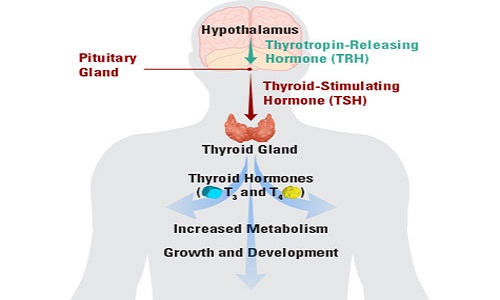Thyroid hormones are rarely mentioned, but in fact, they have a huge impact on our bodies. This means that when the thyroid gland does not function effectively, overall health will certainly be affected. The following article will help you better understand what thyroid hormones are and how important the role of this hormone is.
In our body, thyroid hormones play a major role in controlling the body’s metabolic rate. Once the body has excess/deficiency of thyroid hormones, we are at risk of facing many dangerous diseases, including goiter, dilated cardiomyopathy, heart failure, peripheral neuropathy, myxedema, infertility, birth defects, etc.
What are thyroid hormones? The important role of thyroid hormones
The thyroid is the largest endocrine gland in the endocrine system, capable of affecting everything from metabolism to heart rate. Located behind the trachea, the thyroid gland secretes important thyroid hormones, including Thyroxine (T4) and Tri-iodothyronine (T3).

Thyroid hormones are responsible for controlling the body’s metabolic rate.
Thyroid hormones play a vital role in the body. They act on all cells and are involved in almost all metabolic activities. Specifically:
Influence on carbohydrate metabolism
Thyroid hormones have the ability to stimulate all factors related to carbohydrate metabolism, including promoting the ability of cells to receive glucose, while increasing the synthesis of glucose from non-carbohydrate substances, etc.
Influence on fat metabolism
Influencing almost every aspect of fat metabolism, thyroid hormones facilitate the oxidation of fatty acids in cells. However, excessive mobilization can increase the concentration of free fatty acids in the plasma.

Thyroid hormone imbalance will affect most metabolic activities.
Effects on blood lipids and liver
High levels of thyroid hormones reduce cholesterol, phospholipids and triglycerides in the blood. If thyroid hormone secretion is reduced, it will lead to increased fat storage in the liver.
Effects on the rate of metabolism
Thyroid hormones play an important role in increasing metabolism in various tissues. Thyroid hormone deficiency will severely reduce the body’s metabolic rate.
Effects on body mass
Increased thyroid hormone secretion can reduce body mass, but the ability of thyroid hormone to stimulate appetite can counteract this effect.
Effects on the respiratory process
Increased metabolism in the body increases the need for oxygen, affecting the frequency and intensity of respiration.
Effects on the cardiovascular system
Increased metabolism requires more oxygen, affecting the heart rate and circulation. In addition, excessive thyroid hormone concentrations can lead to heart failure.

Should check thyroid when there are abnormal signs
Effects on the digestive system
Increased levels of thyroid hormones will promote the secretion and motility of the digestive system, potentially causing diarrhea. Conversely, a deficiency of this hormone can lead to constipation.
Effects on the central nervous system
Thyroid hormones speed up mental activities, dysfunction can cause nervous disorders and restlessness.
Effects on other endocrine glands
Increased thyroid hormone secretion will stimulate increased hormone release in most other endocrine glands.
Is there a problem with a lack or excess of thyroid hormones?
Thyroid hormones, although small, play a huge role in our health. In other words, thyroid hormone imbalance can lead to a myriad of health problems, including thyroid-related diseases, cardiovascular diseases, infertility, miscarriage, and even affect the nervous system.
Signs of thyroid hormone deficiency
There are many signs that help us recognize the risk of thyroid hormone deficiency:
- Frequent fatigue, headaches, dizziness;
- Absent-mindedness;
- Depression, mood swings;
- Dry hair and skin;
- Menstrual disorders;
- The body feels too cold in winter, and too hot in summer.
Hypothyroidism is the main cause of thyroid hormone deficiency. If thyroid hormone deficiency persists, it can easily lead to the risk of the following diseases: Goiter, cardiovascular disease, mental disorders, peripheral neuropathy, infertility and birth defects, etc.

Thyroid hormone deficiency causes fatigue and menstrual disorders.
Signs of excess thyroid hormone
Both excess and deficiency of thyroid hormone are not good for your overall health. In case of excess thyroid hormone, you may experience some symptoms such as rapid weight loss, diarrhea, paralysis of the legs, insomnia, sensitivity to light, bulging eyes, fatigue and shortness of breath on exertion.

Excess thyroid hormone causes patients to lose weight rapidly, have diarrhea,…
Hyperthyroidism is the main cause of excess thyroid hormones. In this case, you are at high risk of atrial fibrillation, heart failure and osteoporosis, especially in postmenopausal women.
In addition to thyroid hormone deficiency and excess, other thyroid-related diseases include thyroiditis, goiter and thyroid cancer. The clinical manifestations of these diseases are very diverse, making it difficult to detect the disease early.
Strategies to prevent thyroid hormone imbalance
According to medical specialists, each of us needs to proactively prevent diseases and protect our bodies through daily diet and activities.
Specifically:
- Establish a healthy diet: You should have a diet with a variety of foods, including increasing the intake of vegetables, tubers and fruits.
- Exercise regularly: Regularly exercise every day through sports suitable for your body condition.
- Scientific lifestyle: Avoid staying up late, sleeping late as well as minimizing the amount of pressure and stress you put yourself under. Let your body and mind rest, get enough sleep, especially avoid alcoholic beverages and fried foods with lots of oil.
- Iodine should be supplemented with appropriate amounts, especially for pregnant women.
- Regular health check-ups should be done to detect diseases early and treat them promptly.

Eating a balanced, healthy diet helps prevent thyroid hormone imbalance.
In short, the thyroid gland and thyroid hormones are very important to our overall health. To prevent disease and ensure stable thyroid function, we must always proactively adopt a thyroid-friendly lifestyle from the beginning, avoiding thyroid imbalance that leads to many dangerous health conditions.





